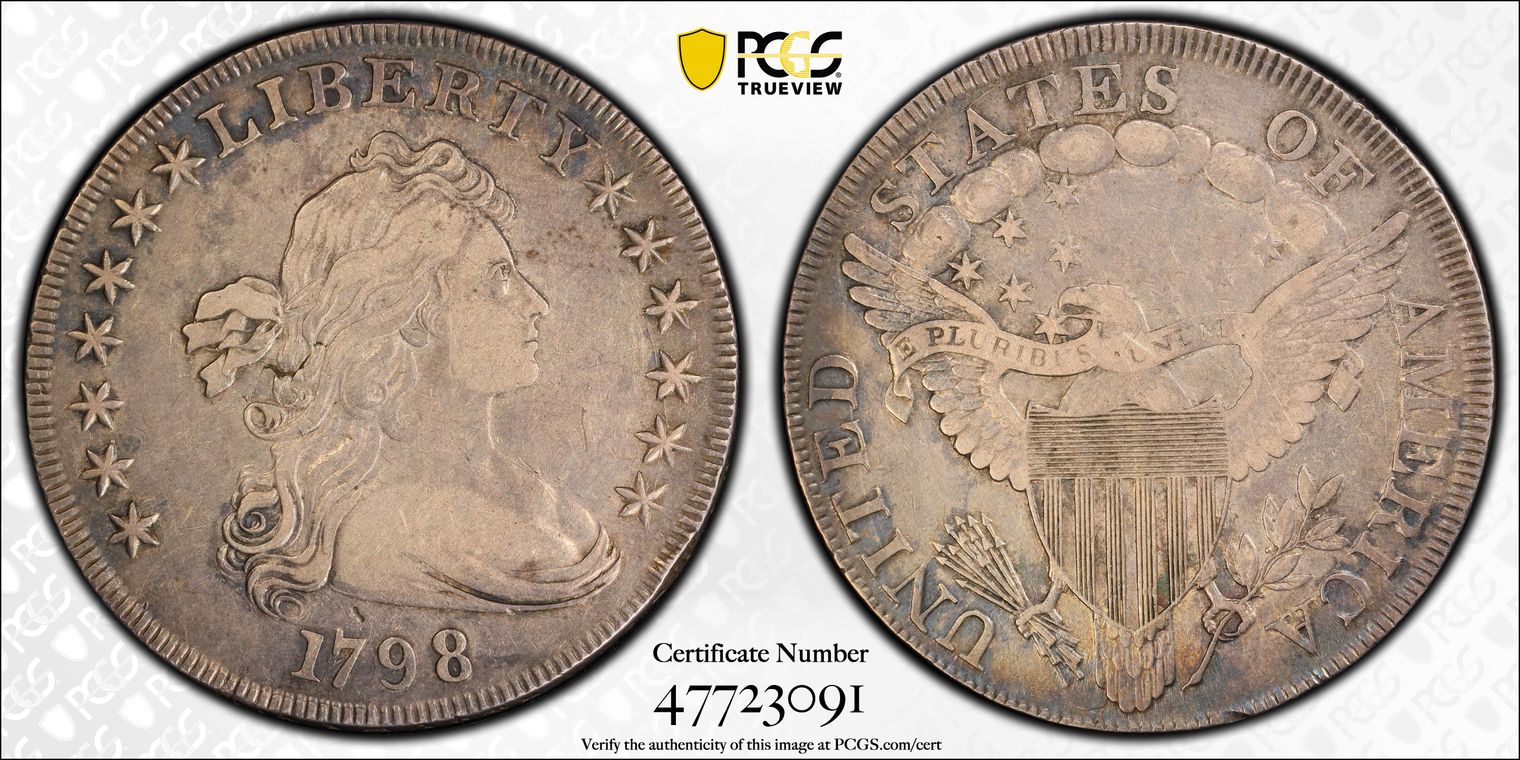1798 $1 BB-120 VF30 认证号47723091, PCGS号40037
专家评论
Q. David Bowers
The following narrative, with minor editing, is from my "Silver Dollars & Trade Dollars of the United States: A Complete Encyclopedia" (Wolfeboro, NH: Bowers and Merena Galleries, Inc., 1993). Note: the Notable Specimens list should be used with caution - it has been updated in my 2013 edition of "The Encyclopedia of United States Silver Dollars 1794-1804."B-12. H-12.
OBVERSE 14: 17 of date close together, other figures wider apart. The date measures slightly more than 10 mm. across at the bottom widest part. Star 1 distant 3.5 mm. from curl. In date, 1 is near curl, 8 far from bust. Lips of Liberty open. On the left, stars quite evenly spaced, but the space between stars 6-7 is very slightly wider. On the right, stars 10-11 most widely spaced. Star 13 points to center of a denticle.
Obverse die used to strike 1798 BB-120 only.
REVERSE Q: See description under 1798 BB-119.
Reverse die used to strike 1798 BB-119 (earlier state) and BB-120 (later state).
DIE STATES:
Die State I: Perfect dies; no crack on reverse. May not exist. (This die state and Die State II were used to coin BB-119).
Die State II: Die crack through UNITED, two left most wing tip feathers, and ST, continuing to the top of A and above T. The die state usually seen.
Die State III: Obverse now shows a crack from a denticle between the 7 and the 9 to the drapery as well as other cracks from the border upward and slightly left, through the innermost rays of star 1, to the field opposite the ribbons. Another crack connects stars 11 to 13.
Die State IV: Obverse crack on right now goes from star 13 to 11 (as before), through innermost ray of star 10, to field opposite forehead. Curved arc crack from bust through bottom ray of star 15 curving to border. Additional crack from border up to drapery on right. Additional crack from border to second lowest curl on left. On reverse, new crack develops from left stand of M in AMERICA, under M and under E. A VG specimen in the Gross Collection was obtained from Jules Reiver, March 1983.
Die State V: The very rare terminal die state (cf. Gilhousen:1233, VF) shows die failure at the drapery and the corresponding reverse plus a crack at ES OF AM.
COLLECTING NOTES: 1798 BB-120 is of medium scarcity. I estimate that about 225 to 425 exist, most of which are in circulated grades through VF. At the EF or better level BB-120 is rare.
NOTABLE SPECIMENS:
Somerset Specimen. AU-55. Bowers and Merena, Somerset Collection, 1992:132l. "Lightly cleaned at one time, but still very attractive. Mostly bright silver surfaces with mottled light gray and lilac toning, particularly on the reverse."
Tuttle Specimen. AU-50. Bowers and Ruddy, Tuttle Collection, 1981:2980. "Sharply struck in most areas, well-defined with some original mint lustre. A few scattered marks here and there."
Auction '84 Specimen. EF-45 . Superior, Auction '84, 1984:168. "Well struck on a smooth problem-free planchet. and quite lustrous with pleasing pale lilac and golden highlights."
Baldenhofer Specimen. EF-45. W.G. Baldenhofer Collection, to Stack's Farish-Baldenhofer Sale. AJ. Ostheimer, 3rd Collection. ANA Convention Sale, Superior, 1975: 866. "EF-45 or better, but cleaned. Well centered and struck, except for the center portion of the reverse." A.M.
Smith Specimen. EF-40. A.M. Smith Collection, Bolender, 1935. M.H. Bolender Collection, Bolender, 1952:55. "EF, but a few stars on reverse are always weakly struck in this rare variety, because of high relief of bust."
Ebsen Specimen. EF-40 . Superior, Buddy Ebsen Collection, 1987:1896. "Evenly struck on a problem-free planchet with nice clean fields and rims. Traces of mint lustre are still adhering to the protected areas of the devices, with light wear spread evenly on the highest points. Attractive antique toning comprised of grayish violet with golden and turquoise iridescent highlights."
New Netherlands 57th Sale Specimen. EF-40. 1963:1059. "Nearly EF where struck-up, but due to die collapse, this coin is very flat in the centers. Highly lustrous, with a lovely peripheral iridescence."
Ostheimer Specimen. EF-40. Lester Merkin, 1968:254. "Marked EF, this is nearly that level in sharpness, with surfaces showing mint lustre and some streaky gray tone."
Gilhousen Specimen. VF-30. Superior, 1973:1233. "Unpublished shattered die, 'Bolender-12a,' obverse cracked between 79 up to drapery; from rim through first star, and from rim at lower right stars. Reverse crack described for Bolender-12 now extends through dentils over ES OF AM; an obverse crack through drapery has occasioned massive die failure, weakening drapery and rendering opposite stars (behind eagle's head) illegible. Better than VF for coin."
Westchester Specimen. VF-20. Bowers and Merena, 1987:601. "Value of VF-20, but actually Choice EF-45. There is a planchet defect on the rim near the 4:30 position. Deeply toned in blue, violet, and shades of gold."
PCGS #
40037
设计师
Robert Scot
边缘
Lettered: HUNDRED CENTS ONE DOLLAR OR UNIT
直径
40.00 毫米
重量
27.00 克
铸币数量
287536
金属成分
90% Silver, 10% Copper
更高评级数量
8
评级较低的钱币数量
2
地区
The United States of America
价格指南
PCGS 数量报告
拍卖 - PCGS 评级的
拍卖 - NGC 评级的























